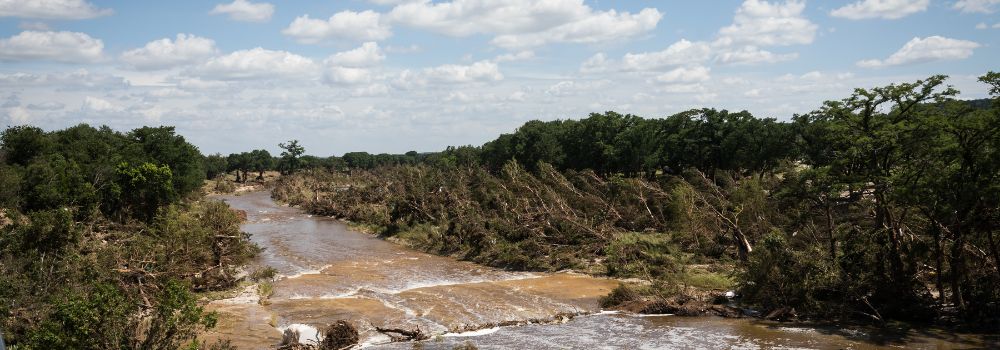
Rushing water and broken trees along the Guadalupe River in downtown Kerrville, Texas July 8, 2025. Source: Kelly Williams via Shutterstock.
This has been an especially active year for flash flooding across the United States. The National Weather Service has already issued more than 3,600 flash flood warnings nationally. Since the start of July, severe flooding has caused damage in New York, Oklahoma, Kansas, Vermont, Illinois, and Iowa. Flash floods in Texas, New Mexico, West Virginia, North Carolina, and New Jersey were deadly.
The July 4, 2025 flood on the Guadalupe River—which runs through a part Texas known as “Flash Flood Alley”—killed at least 135 people, including more than two dozen children and counselors at Camp Mystic, a girls’ summer camp on the river’s bank.
Two back-to-back flash floods also hit the small mountain town of Ruidoso, New Mexico. Heavy rainstorms triggered the torrents, the first of which destroyed 35 homes and killed three people. Burn scars left behind by a 2024 wildfire exacerbated flood risk there.
Flash floods are the most lethal storm-related hazards in the U.S., according to the National Weather Service. Experts warn that the effects of global climate change, driven by fossil fuel pollution, will continue to intensify flooding as warmer-than-normal air and ocean temperatures boost heavy rainfall.
As communities across the nation grapple with this harrowing summer of flooding, it is imperative that researchers and practitioners share what they are learning and ensure that the knowledge is actionable for communities at risk. The Natural Hazards Center offers resources that can support research and its applications to improve operational forecasts and warnings, minimize property damage, reduce injuries and deaths, and ultimately contribute to the collective good.
Flood-Related Publications
With funding from federal agencies, the Natural Hazards Center has supported more than 50 research projects to investigate floods. Please visit this page for reports, data publications, and other resources that demonstrate key insights about flood risk assessment, mapping, and communication strategies, among many other relevant topics. The publications offer important findings and specific recommendations that can be applied to reduce current suffering and future harm.
Quick Response Research Awards
The National Science Foundation-funded Quick Response Award Program provides training and funds for researchers to quickly collect perishable data following floods and other disasters. Available funds administered through the Natural Hazards Center will support awards up to $5,000 each.
CONVERGE Resources
The CONVERGE Training Modules and Extreme Events Research Check Sheets can help cultivate the skills and understanding needed to conduct ethical and culturally competent disaster research. Trainings are geared toward understanding the emotional challenges of such research, collecting perishable data, working with socially vulnerable populations, engaging in reciprocal research partnerships, and several other relevant topics.
SSEER Network
The Social Science Extreme Events Research Network—or SSEER—is a global network of social scientists who study hazards and disasters. Please visit the SSEER map to identify locally affected researchers and social scientists who study topics relevant to this disaster such as the human effects of hurricanes, evacuation behavior, warnings, and health outcomes.
For more information about the Natural Hazards Center and our various resources, please sign up for updates.